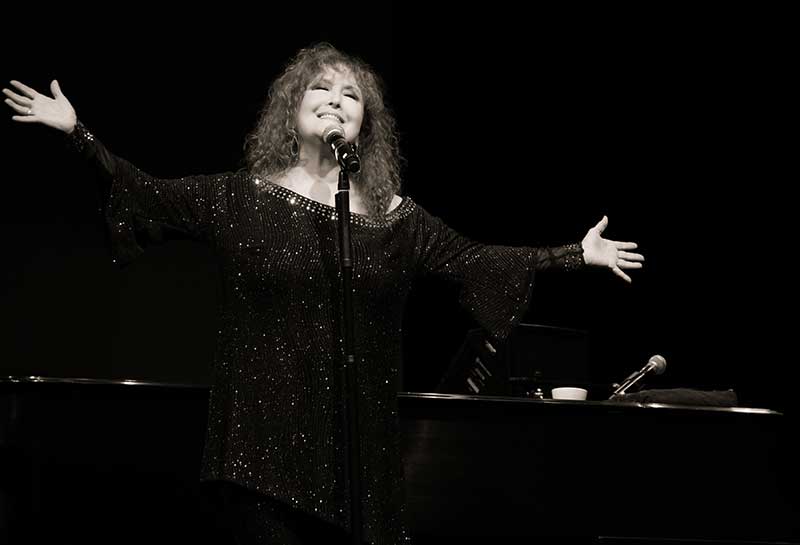
Photo of Melissa Manchester courtesy of Sasaphotos.com (Sheryl Aronson & Sherman Alford)
Melissa Manchester: Reimagining Her Classic Hits in Her 24th Album Re: View
BY SHERYL ARONSON
After 50 years of performing, Melissa Manchester, a Grammy Award-winner and multi-Academy Award-nominated artist, decided to apply a new twist for unveiling her 24th album, Re:View. Since September 2020, Manchester has been reimagining her charted hit songs from the 70s and 80s, releasing music videos. To date, six videos from ten chosen songs have been released: “Just You and I,” “Midnight Blue,” “Don’t Cry Out Loud,” “You Should Hear How She Talks About You,” “Fire in the Morning,” and “Come in From the Rain.”
Melissa Manchester’s illustrious career began in the late 1960s as she worked alongside aspiring musicians and composers of that day, including Barry Manilow, Ashford and Simpson, and Patty Austin. The Brill Building in Manhattan housed these creative, talented up-and-coming artists. At 17 years of age, Manchester was already writing songs.
“In 1968, the Brill Building was the center for songwriting. Publishers would sign artists. I was a jingle singer. We all had dreams to be singer/songwriters and be signed for a record deal. We traveled in a pack. It was no big deal to hear about your friend getting a record deal or hitting the road for a tour. I even worked as a gopher on Sesame Street and parked cars to be around creative people. It was a thrilling time to be alive.”
Manchester received her first Grammy nomination in 1979 for singing the Peter/Allen/Carole Bayer Sager hit song, “Don’t Cry Out Loud.” In 1980, she was the first artist ever in the history of the Academy Awards to be nominated for two songs, “Through the Eyes of Love” (Ice Castles) and “I’ll Never Say Goodbye” (The Promise in the same year.) In 1982, Manchester won a Grammy for Best Female Pop Vocal Performance for the song “You Should Hear How She Talks About You.” In May of 2021, Melissa was inducted into Michael Feinstein’s Great American Songbook Hall of Fame after a joint performance with Feinstein. In December of 2021, she was one of the presenters at the Kennedy Center Awards, honoring her longtime friend, Bette Midler.
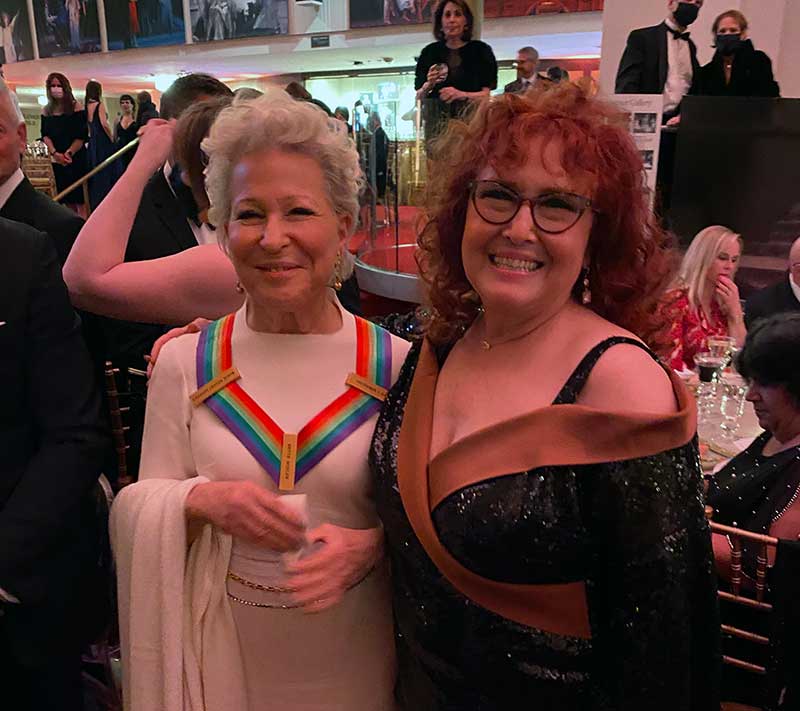
Melissa Manchester with Bette Midler at the Kennedy Center, photo by Mila Baturin
On March 5th, 2022, Melissa Manchester performed a concert at the theater in Laguna Woods, California, to a sold-out house. Accompanied by John Proulx on keyboards and Susan Holder on percussion, the night turned magical as the audience watched Melissa exude her majesty of heartfelt storytelling.
No worries, Las Vegas, because you’ll be able to see the legendary Melissa Manchester live at the Smith Center on June 25th, 2022.
I sat down with Melissa Manchester in the comfort of her living room and talked about how she has been reimagining her new album Re: View.
SA: How did Re: View come to fruition?
MM: “I thought it was time to re-record several of my uncharted hits for many reasons. One, I’ve grown with these songs. They’ve become living monologues, and I have tweaked some of the harmonics over the years. The other part, like many of my colleagues also re-recording their charted hits, is that now we can own the master. Prior to this, the record company that signed us in the 60s, 70s, and 80s owned the masters, and it isn’t concrete because the context of those contracts had no vision of social media or any of these new revenue streams.”
“So I started releasing a video to go with each single when we were in the depth and height of the pandemic, and each video reflects what we were going through.”
“The first single was a song I wrote with Carole Sager called “Just You and I.” The video was an homage to all the front-line workers. We have about four more videos to do, one more song to finish recording, and then we will release a CD. But once you look at all of the videos, it will be like a travel log of what we’ve been going through.”
SA: Talk about the album’s name because it’s very telling.
MM: “Re: View is about viewing something again.”
SA: How was it to “re: view” the songs?
MM: “I have never gotten bored singing these songs. I am bending around the corner of 50 years of my career, and these songs are such blessings because they have become living monologues. I know so much more about the interior life of “Midnight Blue” and songs that were gifted to me [like] “Through the Eyes of Love” and “Don’t Cry Out Loud.”
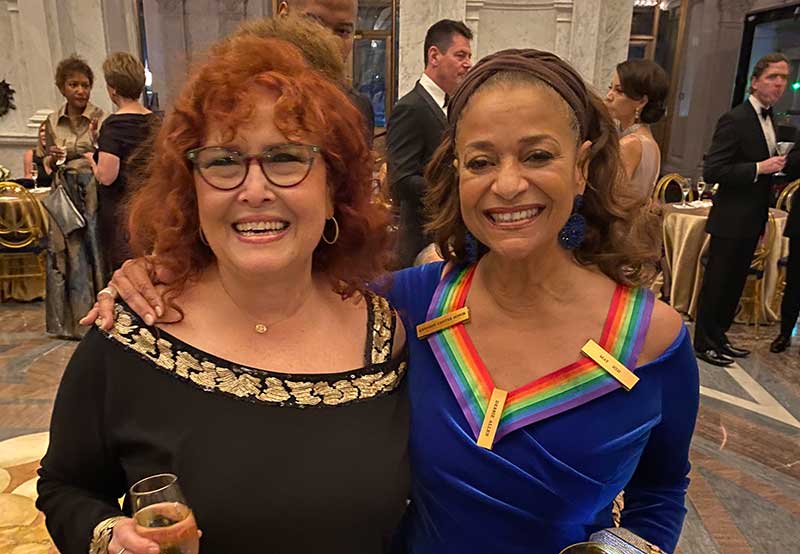
Melissa Manchester with Debbie Allen at the Kennedy Center, photo by Mila Baturin
“I got a chance to record much of it down at Citrus College before the pandemic. Citrus College is a community college where they have an astounding music department. Many of these kids are first-generation college students, many are children of immigrants, and many don’t really play anything yet. They want to be part of a musical something … a band, orchestra, choir, or musical theater. And their studio is state of the art, simply magnificent.”
SA: You’ve recorded a few albums there.
MM: “Two albums there, yes. I recorded my 20th album, You’ve Gotta Love the Life. That’s when Stevie Wonder, the late Al Jarreau, and Dionne Warwick came, and it was just spectacular for the students to see the collaboration and what creating music could be like. So, it was great, and I’m very devoted to the students. When they play on my albums, they get real-time performance credits, so it’s a win-win.”
SA: You have a chorus with the students. Which song is that on?
MM: “Just You and I,” the first single we released last time. I wrote the choir parts, and the Citrus singers—you see them in the video—are beautifully trained and sang magnificently.”
SA: “Midnight Blue” is a classic, and I love how you redid that.
MM: “Yes, it’s a true musical conversation between present me and the me that was there when she was made famous in the mid-70s. It’s very touching.” [Laughs].
SA: In the video “Don’t Cry Out Loud,” I noticed a bit of social commentary.
MM: “Correct. “Don’t Cry Out Loud” was another one that grew into this moment when all the venues on the planet had shut down. We’d never been through a plague like this where nobody could get out [and] nobody could be around anybody else. So, “Don’t Cry Out Loud” was sort of a rallying cry for me. It’s an anthem. Carole Sager’s magnificent words of “Don’t Cry Out Loud” became much more potent! It was very interesting to use the video as an instrument to help reframe this new inner life of the song.”
SA: How did you come up with the idea of releasing your album in videos?
MM: “Well, none of us was going anywhere. I thought the unexpected gift of being in isolation for all of 2020 was that not only could I look at society, but I could see it for the first time. I could see what was beautiful, broken, and unfinished, and I thought, “let’s service that.” Let’s slow the experience of releasing the single with the video to go with that moment. And then the next month, let’s do another. And if it takes us two more months to get the next one ready … again, who’s going anywhere? It was deeply creative, and all the folks that I work with (my director Paco Silva and his crew and, of course, Sue Holder, my manager) got a chance to reframe how we were going to do this. At the end, there will be a hard copy CD so that you can look at all the credits. When I perform now, I will be using all these videos.”
SA: Last Thanksgiving, you released “Come in From the Rain,” which you wrote a long time ago.
MM: “Yes, with Carole Sager. When we wrote it, we were young and married, and we were trying to figure out how to communicate with our young husbands. We were wrestling with these ideas, and the song showed up. I have lived so much longer, so the song is kind of optimistic. The video itself is very dramatic; very George Hurrell, very 1930s, and in black and white. But the actual song is welcoming and open-hearted for the listener because they’re not alone. We have all learned and have gotten over the folly of our immaturity. We have forgiven other people and have forgiven ourselves for expectations. The song is sort of about that.”
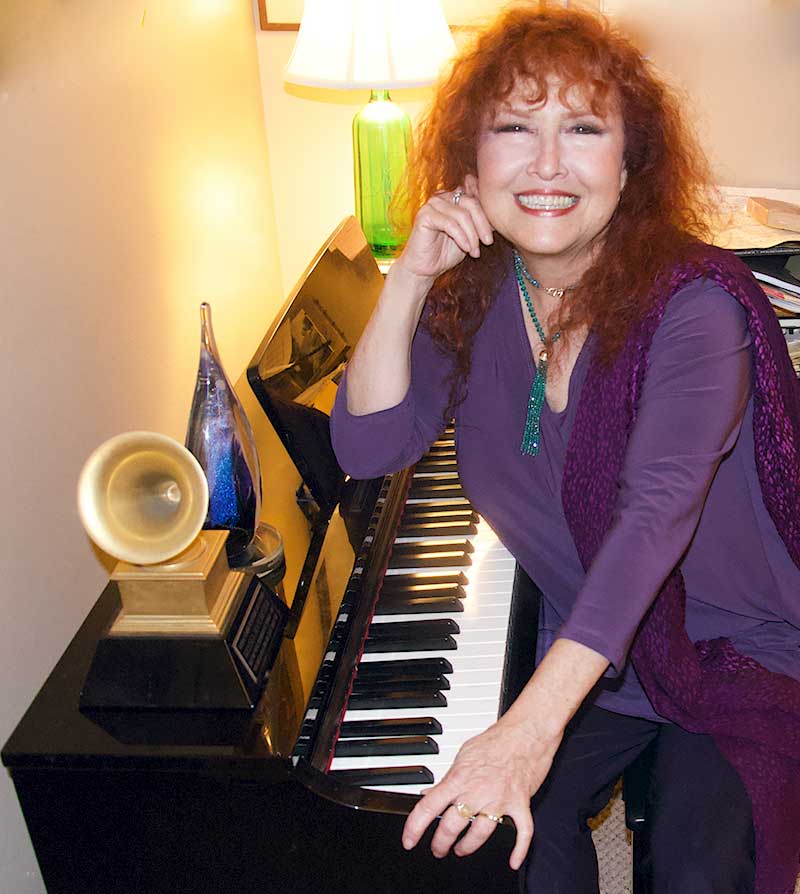
Photo of Melissa Manchester courtesy of Sasaphotos.com
SA: You’re from New York City?
MM: “Yes, I’m from the Bronx and Manhattan.”
SA: Your father was a bassoonist?
MM: “Yes, for the Metropolitan Opera. I grew up around opera all my life.”
SA: In your song, “Come In From the Rain,” you have a bassoonist?
MM: “Always, yes … William Wood. I have a bassoonist playing a new arrangement. My father played the original arrangement.
SA: “You Should Hear How She Talks About You.” What’s its purpose?
MM: “Well, we did two videos for that song because when the election ended, happily … I wanted to use “You Should Hear How She Talks About You” as the “She” in the title being our nation. And I wanted it to salute the incredible voter turnout that happened. I showed that one when I first started to perform again, but then I realized I didn’t want to think about politics anymore, so we did a second video that you can now see. It’s actually kind of fun because it’s about my original performances around the time I won the Grammy for that song, and me now.”
SA: Tell me about the last song, which is very romantic.
MM: “Fire in the Morning.” It’s a very sweet song. My fans ask me to perform that song a lot, and I don’t, just because I haven’t rehearsed it and we have so many other ones. I wanted to do it as a nod to them.”
SA: There will be ten songs on the album. Can you say a little bit more about that?
MM: “Yes. I’m re-recording “Whenever I Call You Friend,” a song I wrote with Kenny Loggins, and I’m re-recording “Just Too Many People” that I wrote with Vini Poncia. And there’s a new song out, an old song that I never recorded, so that’ll be fun.”
SA: You were saying how the pandemic affected you as an artist. What were the good points and not-so-good points?
MM: “The good point was that I got a chance to finish my choral suite. The final portion of it, which I wrote first, is called Awake! And there is a video of that on YouTube, so that will be the finale of the suite. But there are two other pieces that are just being copied and proofread now, and then I’ll record them and hopefully get a choir to sing them.”
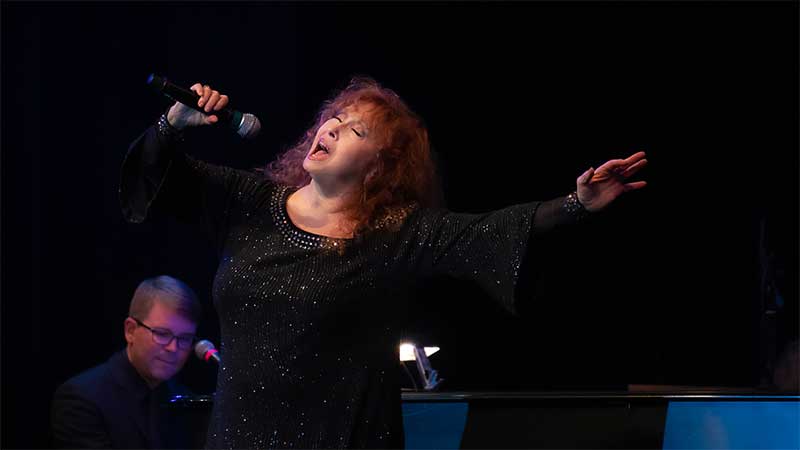
Melissa Manchester at the Laguna Woods Theater, photo courtesy of Sasaphotos.com
SA: You took a break from the music industry. Then, you returned and reinvented another round of creativity.
MM: “Well, I always wanted to have children, so I took time off to raise my kids, and while I was doing that, I was able to work on some wonderful projects for the Disney company. I wrote a song for The Great Mouse Detective and wrote the score for Lady and the Tramp 2. By the time I was ready to go back on the road when my kids were old enough, I had to start all over again and find new ways to move forward in my career. Then I was invited to teach at USC Thornton School of Music, where I met wonderful students who introduced me to the world of crowdfunding, and they helped me with my projects. My first album on crowdfunding was You’ve Gotta Love the Life, my 20th album.”
SA: Amazing album!
MM: “Thank you. The second album with crowdfunding was The Fellas, my tribute to several of the great male singers. I’m not doing crowdfunding with Re: View, but it allowed me to see the new normal that young artists take for granted.”
SA: What are some things you’d like to tell members of the younger generation aspiring to be musicians?
MM: “Well, one of the things I would say is to listen to the [Great] American songbook. Go on YouTube and listen to Nat [King] Cole, listen to Sinatra, listen to Tony Bennett, listen to the women, listen to Ella Fitzgerald, listen to Billie Holiday, listen to Judy Garland. Listen to the structure of what popular music sounded like. When I’m teaching a semester, I always assign my kids a song to learn from the American Songbook. And invariably, they’ll say, “You have to breathe so differently.” The reason you breathe differently is those were very long lyrical ideas, followed by long melodic ideas. These days, because percussion is walking into the room first, the phrases are very short and repeated. But to actually develop an idea is really different. So, I think that’s why I love working with Michael Feinstein because his American Songbook Foundation has been spectacular. I’ve done a Master class for him, and I think he’s the nation’s archivist.”
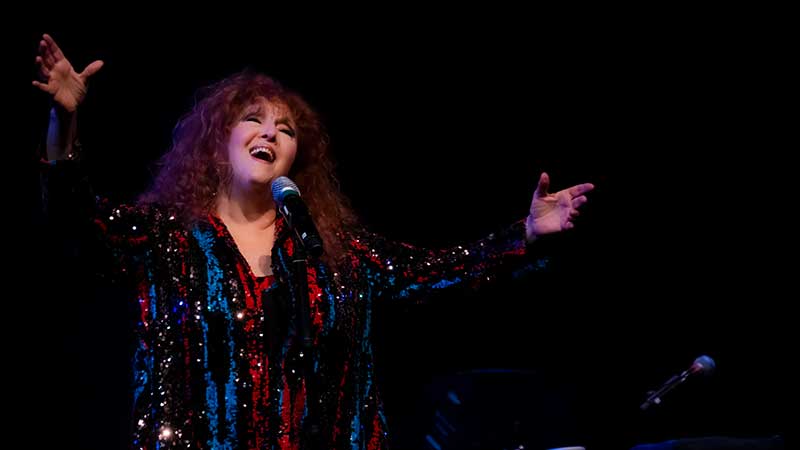
Melissa Manchester at the Laguna Woods Theater, photo courtesy of Sasaphotos.com
SA: Congratulations on your award from Michael Feinstein!
MM: “Thank you very much. It was for the American Songbook Foundation for new standards. I was given an award, and posthumous awards were given to the great Sammy Cahn and the brilliant genius [Billy] Strayhorn. To be in that company was just really rarified. The actual concert I did with Michael was in Carmel, Indiana, where the foundation resides. It was our first concert out of the pandemic, and the audience was thrilled to be back in the community.”
SA: Also, you got to present an award to your wonderful friend.
MM: “Yes, it was such a thrilling experience. I got a chance to pay tribute to the remarkable Bette Midler, who just won a Kennedy Center Honor, along with Berry Gordy and the opera star Justino Diaz, Lorne Michaels, and Joni Mitchell (one of my heroes). It was just stunning to acknowledge and pay tribute to Bette because she was at the beginning of my career. That’s when I knew her. I had helped Barry Manilow create what became the Harlettes, and I was the toots in the middle, the background singer for about six months.”
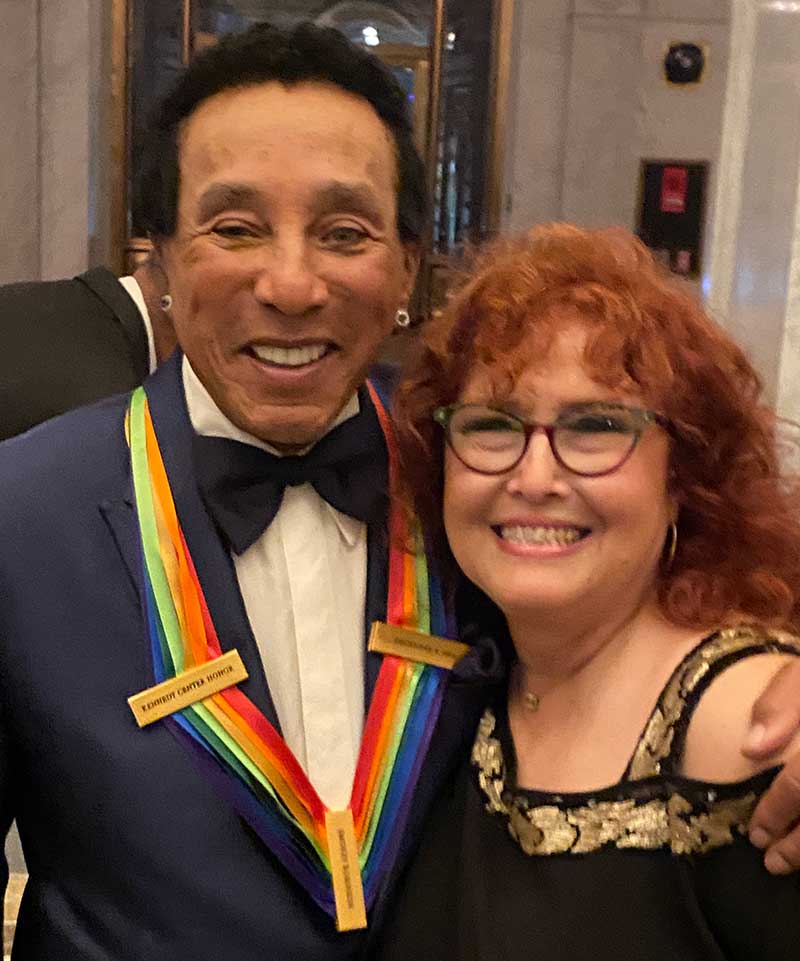
Melissa Manchester with Smokey Robinson at the Kennedy Center, photo by Mila Baturin
SA: What inspires you to write all your beautiful songs?
MM: “Eavesdropping! Eavesdropping and staying open. Frequently as I’m awakening from sleep, I’ll start to hear things. I always have to keep a pad and pencil nearby because you never know.”
SA: Are you ever afraid that the ideas will dry up?
MM: [Shakes her head] “No, the ideas will not dry up. And the urge to express myself artistically will never dry up because spirit doesn’t know time. It doesn’t know age, and it doesn’t know the concept of retiring. It just wants to express. So the most interesting thing to me is to lean into spirit and see (not only express) but how it expresses itself . . . yet insists on being expressed, because that’s the one you want to follow. You have all kinds of interesting ideas all the time, but the one that sort of niggles at you is the one you want to wrestle to the ground and find a shape for and bring to life.”
SA: Are you touring this year?
MM: “I am, and please, God, if all of the venues postponed from the last two years come through, I will have a very busy year, and that’s a beautiful thing.”
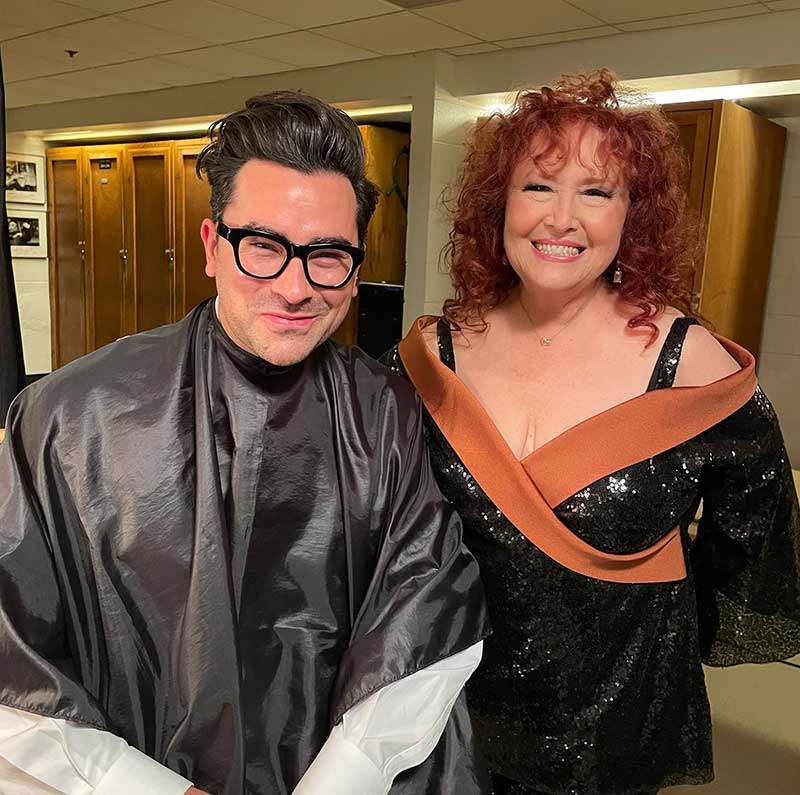
Melissa Manchester with Daniel Levy at the Kennedy Center, photo by Mila Baturin

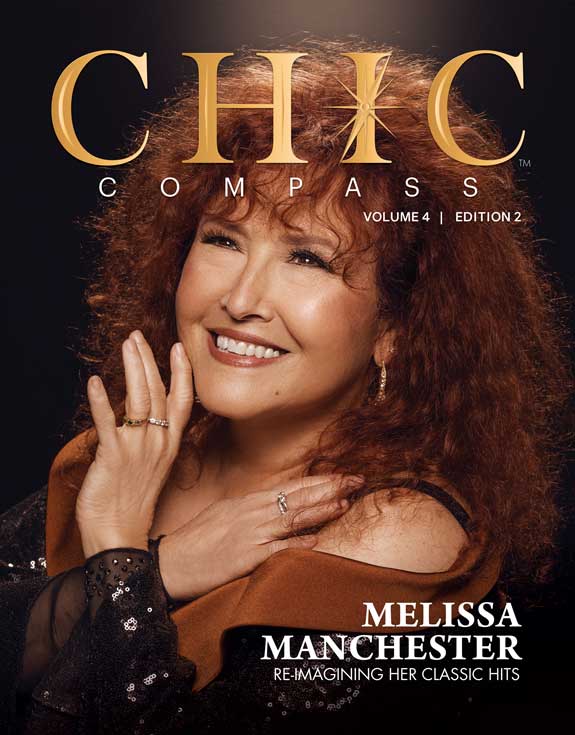
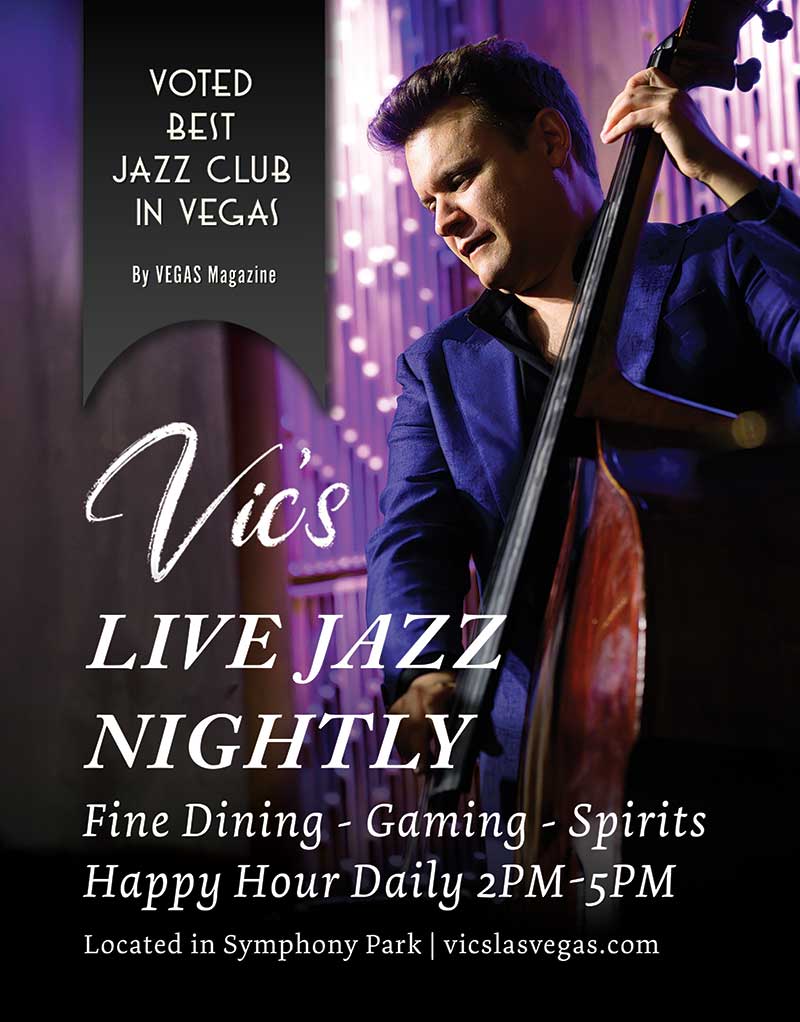
LOVE LOVE LOVE Melissa!! Thank you, Sheryl. Your photos are simply exquisite!